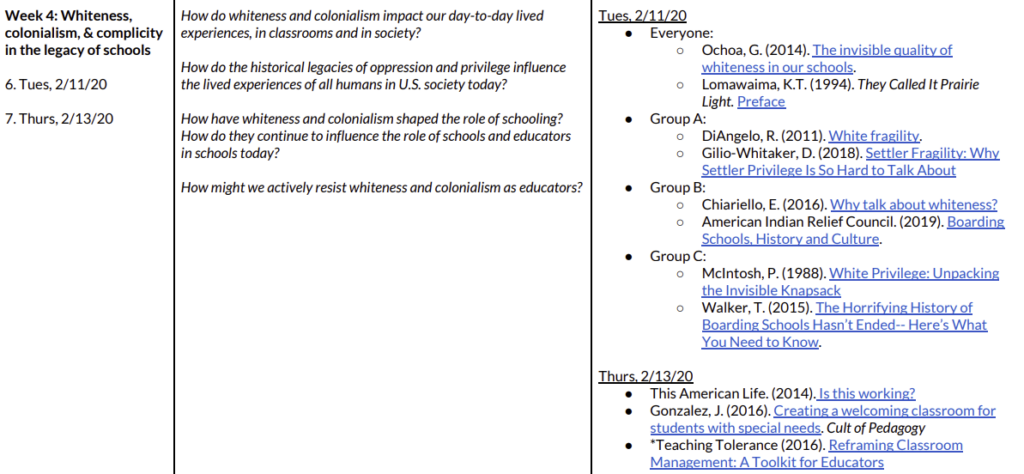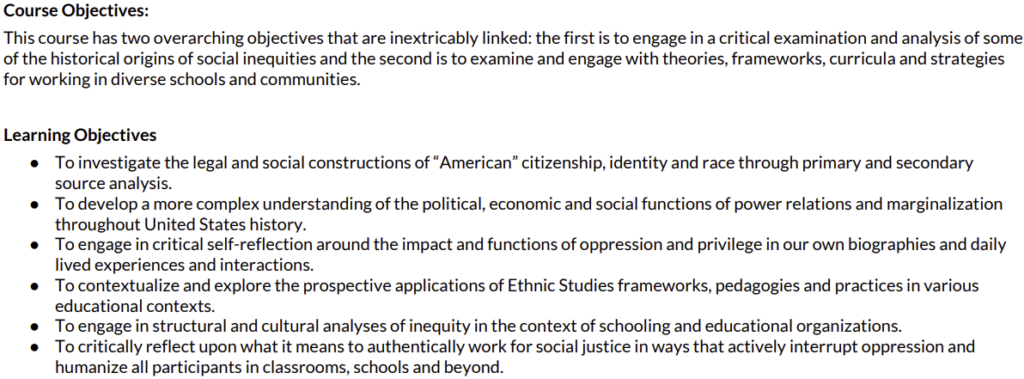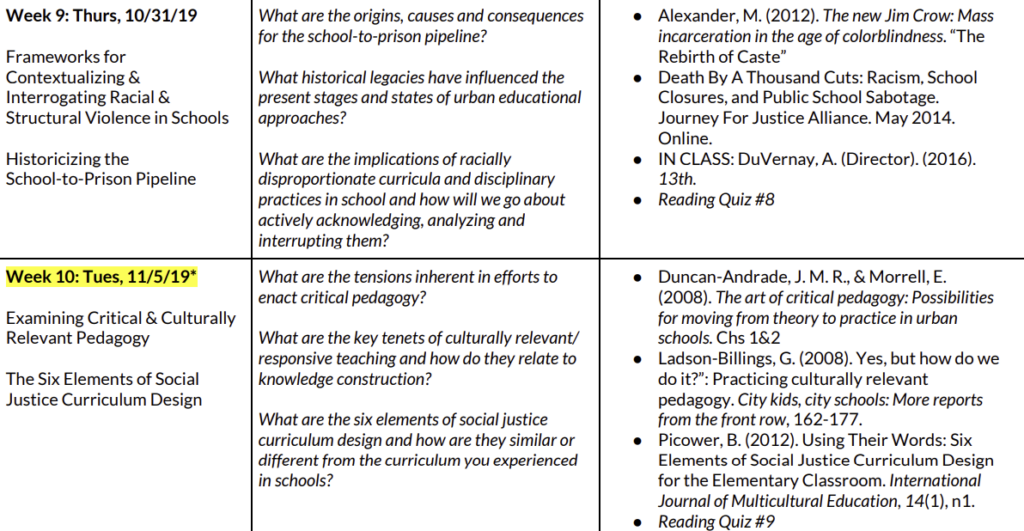Brown University (CorruptED)
Incidents
Brown University’s Department of Education courses feature topics such as critical race theory, tenets of queer theory, white fragility, white privilege, and whiteness. Course texts include Paulo Freire’s Pedagogy of the Oppressed, Bell Hooks’ Teaching to Transgress: Education as the Practice of Freedom, and Robin DiAngelo’s White fragility.
COURSES
EDUC 1010: The Craft of Teaching
The course EDUC 1010: The Craft of Teaching includes content such as critical race theory, critical trans pedagogy, tenets of queer theory, white fragility, white privilege, and whiteness. Course texts include Paulo Freire’s Pedagogy of the Oppressed and Robin DiAngelo’s White fragility.
The description states that students will “investigate how race, class, gender, language, sexuality and policy impact teaching and learning in today’s schools,” as well as the “implications of social and political inequities in…curriculum, classrooms, and practice.” Students in this course will “develop a stronger sense of [their] respective pasts” in order to “better contextualize and critique present conditions faced in classrooms” and “leave informed, equipped and better prepared to advocate on behalf of young people in schools across the nation.”
The course will also address “issues often subsumed under the broad complexities of teaching and learning in the United States, including but not limited to: race, ethnicity, migration, labor & class, sexuality, gender, age, and globalization & imperialism.”

The Learning Objectives include:
- “To critically reflect upon what it means to authentically teach and learn for diversity and social justice in ways that actively interrupt oppression and humanize all participants in current classroom contexts.”
- “To reflect upon and explore our various educational experiences, and consider how these experiences inform our analysis of current issues in education.”
- “To develop a more complex and historicized understanding of the political, economic and social functions of power relations and marginalization in urban public education.”
- “To explore the prospects of applying culturally responsive curricula and pedagogy in diverse classroom settings.”

Assigned readings include the topics of critical race theory, meritocracy, white fragility, and settler privilege:
- Freire, P. (1970). Pedagogy of the oppressed
- Anderson, M. (2017). Why the Myth of Meritocracy Hurts Kids of Color
- Ochoa, G. (2014). The invisible quality of whiteness in our schools
- DiAngelo, R. (2011). White fragility
- Gilio-Whitaker, D. (2018). Settler Fragility: Why Settler Privilege Is So Hard to Talk About
- Chiariello, E. (2016). Why talk about whiteness?
- McIntosh, P. (1988). White Privilege: Unpacking the Invisible Knapsack
- Schmidt, S. J. (2010). Queering social studies: The role of social studies in normalizing citizens and sexuality in the common good
- Grady, J., Marquez, R., & McLaren, P. (2012). A critique of neoliberalism with fierceness: Queer youth of color creating dialogues of resistance
- Yosso, T.J. (2005). Whose culture has capital? A critical race theory discussion of community cultural wealth

EDUC 1520: Ethnic Studies & Education
The course EDUC 1520: Ethnic Studies & Education includes content such as critical pedagogy and white privilege. Course texts include Paulo Freire’s Pedagogy of the Oppressed, Bell Hooks’ Teaching to Transgress: Education as the Practice of Freedom, and Frantz Fanon’s The Wretched of the Earth.
The course description states it “begins with an examination of key events in early U.S. History and the historical and contemporary struggle for Ethnic Studies through a comparative, multiracial lens, followed by analyses of contemporary issues faced by practitioners working in 21st century educational contexts.” This course aims to “develop a stronger sense of our respective pasts and educational biographies, in order to better understand, critique, and contextualize our present, so that we may all leave better equipped to imagine and help build a more equitable future.”

Learning Objectives include:
- “To investigate the legal and social constructions of ‘American’ citizenship, identity and race through primary and secondary source analysis.”
- “To develop a more complex understanding of the political, economic and social functions of power relations and marginalization throughout United States history.”
- “To engage in critical self-reflection around the impact and functions of oppression and privilege in our own biographies and daily lived experiences and interactions.”
- “To critically reflect upon what it means to authentically work for social justice in ways that actively interrupt oppression and humanize all participants in classrooms, schools and beyond.”

Required readings include topics such as white rage, colonialism, critical pedagogy, and critical race theory:
- Alexander, M. (2012). The new Jim Crow: Massincarceration in the age of colorblindness.
- Anderson, C. (2016) White rage: The unspoken truth of our racial divide.
- Césaire, A. (2001). Discourse on colonialism.
- Duncan-Andrade, J. M. R., & Morrell, E. (2008). The art of critical pedagogy: Possibilities for moving from theory to practice in urban schools
- Fanon, F. (1965). The wretched of the earth.
- Freire, P. (1970). Pedagogy of the oppressed.
- Lopez, I. H. (2006). White by law: The legal construction of race.
- Tatum, B.D. (1997). Why are all the Black kids sitting together in the cafeteria?: And other conversations about race.
Required articles include topics such as critical pedagogy, white privilege, and social justice:
- Choi, Y.W., Humphries, E., & Villegas, M. (2016) “A Community of Praxis: Ethnic Studies Development in Oakland Unified School District”
- de los Ríos, C.V. (2017). Picturing Ethnic Studies: Photovoice and Youth Literacies of Social Action.
- de los Ríos, C.V., Lopez, J., & Morrell, E. (2016). Critical ethnic studies in high school classrooms: Academic achievement via social action.
- Death By A Thousand Cuts: Racism, School Closures, and Public School Sabotage. Journey For Justice Alliance.
- Duenas, R., Lopez, J., & Lopez, E. ‘Resistance, Resilience & Re-imagination in the Ethnic Studies Classroom: A Reflection on Roosevelt High School’s Critical Ethnic Studies Course’
- McIntosh, P. (1988). White privilege: Unpacking the invisible knapsack. Race, class, and gender in the United States: An integrated study
- Picower, B. (2012). Using Their Words: Six Elements of Social Justice Curriculum Design for the Elementary Classroom.
Each module for the course has “essential questions,” such as:
- “What evidence of racialized imageries persists in mainstream curriculum and society at large today?”
- “What are varied, complex ways in which oppression exists? (institutional, interpersonal, internalized, ideological)”
- “How do the historical legacies of oppression and privilege influence the lived experiences of all humans in U.S. society today?”
- “What are the implications of systemic inequities in our classrooms and schools, and how might we engage in active resistance and interruption of these legacies?”
- “What are the tensions inherent in efforts to enact critical pedagogy?”
- “How do we actively develop an approach to education that centers radical healing, critical hope, revolutionary love and authentic care?”

Stay Informed
